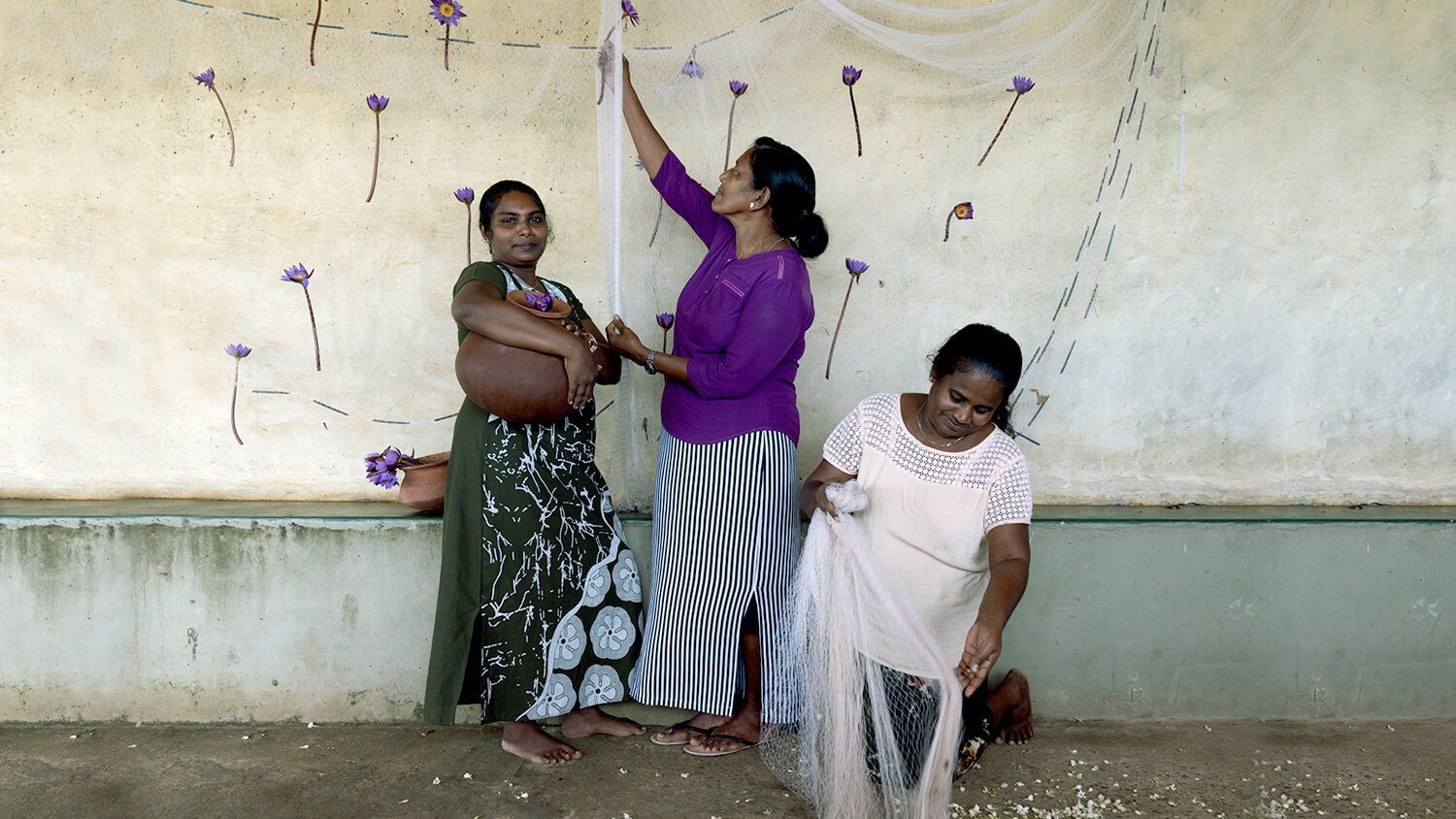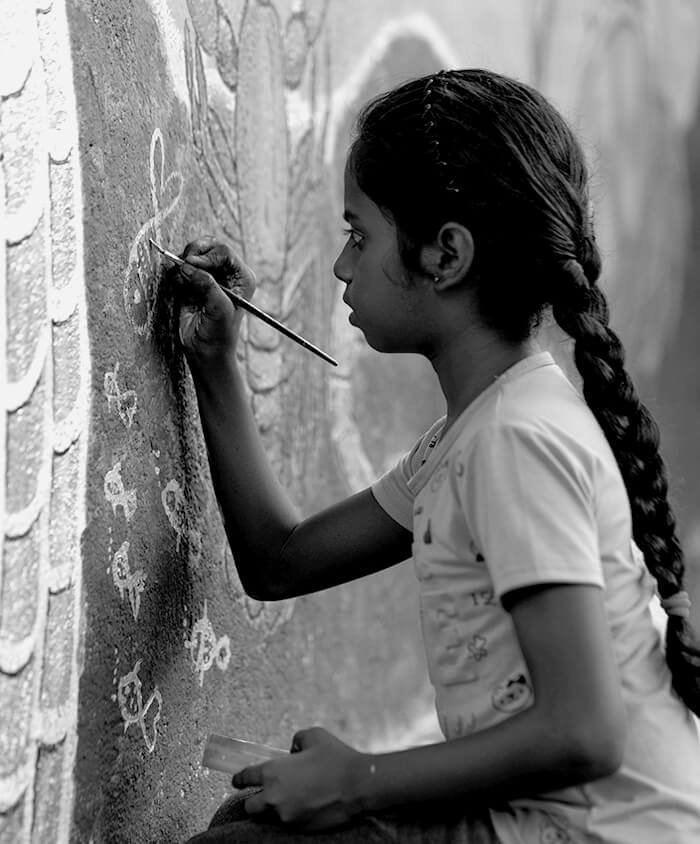FEARLESS X PARLEY: SOURCE, RESOURCE
Parley and Fearless Collective collaborate in Negombo, Sri Lanka, with a mural and workshop exploring connections between women and water, and the unseen leadership in ocean protection.
“The Tides Carry a Message: Tomorrow Will Be Better”
Irushinie Wedage (left) with local fisherwomen
Climate change disproportionately impacts women, yet their voices continue to be marginalized within decision making processes. Still, women the world over are leading climate justice movements and embodying solutions through their own initiatives. Through their ‘At the Root’ campaign, Fearless Collective, a South Asia based public arts movement, wants to reframe the narrative of climate and environmental issues to focus “not on the symptoms, but on the sources or roots and intersections between how we treat our land, our bodies, and our traditions.”
In the run-up to COP27, Parley collaborated with Fearless Collective to help amplify women’s voices as narrators to the current global environmental crisis, honoring the deep and intimate connections between women and the earth. In an effort to highlight the lives and experiences of women in Negombo, Sri Lanka, Fearless and Parley worked with Shri Vimukthi Fisherwomen Organization, associated with the National Fisheries Solidarity Movement (NAFSO), to engage the local community in an immersive initiative held over several days in October 2022.
Through a workshop and mural painting led by Fearless and supported by Parley, the project explored the relationship between generations of fisherwomen and the ocean, their dependence on the water for their livelihoods, the repercussions of the X-Press Pearl Shipping disaster, and their unseen leadership in response to the impacts of global threats include climate change, large-scale industrial fishing activity, and plastic pollution.
Unveiled to the public on October 16th with a community feast and celebration, the completed Negombo mural draws from the women’s personal lived experiences and their stories about the ocean that have been passed down for generations, and embodies their dreams for their community. Its message is one of hope: “The tides carry a message: tomorrow will be better.”
This project marks a starting point for a long-term initiative of Parley Sri Lanka to engage fishing communities along the coasts, with future actions including cleanups and women-led workshops. As Irushinie Wedage, Director of Parley Sri Lanka, explains “this art project is just the beginning of a long-term relationship with local coastal communities. Strategically located within the Municipal Council premises, the mural will be an everyday reminder to the authorities to ensure women are included in the decision-making process. It will also be a positive affirmation for coastal communities to continue their commitments to protect the ‘source’ – the ocean.”
Fearless Collective shared this project among their work at COP27 in Sharm el-Sheikh, where they’re hosting more workshops and a mural painting in the Blue Zone. Follow along on their social channels for updates, and dive into the story from Negombo below.
“At Parley, we are constantly searching for creative ways to engage communities in ocean conservation. Our collaboration with Fearless particularly aimed at creating a space to surface unheard voices of fisherwomen and communicating their complex and inextricable connection with the ocean – their everyday struggles, hopes and dreams, to a wider audience through art.
It was an absolute pleasure to work with women fisher communities and Fearless to create this masterpiece. This art project is just the beginning of a long-term relationship with local coastal communities. Strategically located within the Municipal Council premises, the mural will be an everyday reminder to the authorities to ensure women are included in the decision-making process. It will also be a positive affirmation for coastal communities to continue their commitments to protect the ‘source’ – the ocean.”
Irushinie Wedage, Country Director of Parley Sri Lanka
Words and film by Fearless Collective:
They say that Water is older than the Sun. Many theories exist about how long water has formed the foundation of life on this planet - that water first came to this Earth inside icy comets and meteors. Four billion years of life has emerged from our Oceans- our stories are ancestrally interwoven with this saltwater source.
This October, Fearless and Parley collaborated to work with women from local fishing communities in Negombo, Sri Lanka, speaking to them about their relationship with the sea and looking at the intersections between ocean ecologies, pollution, livelihoods, and gender.
This is a community that has lived by the coast for generations; however, with rapid and unsustainable urbanization, their way of life is increasingly threatened. In addition to this they are also suffering the repercussions of the sinking of the X-Press Pearl in the early weeks of June 2021. This was deemed the worst marine ecological disaster in Sri Lankan history, with a devastating effect on marine life as well as the small-scale fishing industry and families dependent on the oceans for their sustenance. Immediately following this incident a fishing ban was put in place, affecting hundreds of families from fishing communities along the west coast. The ban, along with the pandemic related lockdown and travel restrictions, meant that fisher families already facing many hardships and vulnerabilities in their livelihood, had no way of earning income during this time.
Women from fisher families were particularly vulnerable during this time, as they engage in largely unrecognised and undervalued labour, like post-harvest fish sorting, gutting, salting and drying, in addition to the domestic and care work they do in their homes.
With the microplastic coming from the ship, global media attention has focused on plastic in the Sri Lankan oceans, but this has been a long-term issue that affects both ocean ecosystems and fishing communities who depend on the oceans for their livelihoods.
The women who gathered in our workshop were from Shri Vimukthi Fisherwomen Organization, an NGO started in 2001 by women whose husbands and sons had been detained by Indian authorities for fishing in Indian waters. They are a subsidiary of National Fisheries Solidarity Organisation (NAFSO), working initially to have their family members released and since to lobby the government to defend their rights and to bring about good environmental practices in coastal areas.
On the back porch of a local fisherman’s home overlooking the ocean, we sat together and listened to the women speak about the fears they carried for the things they were losing, understanding the disconnections that have occurred as a result of the plastic crisis and huge developments like the Port City project, and of industrial trawling and fishing. The women spoke about a way of life that was fast changing. After the tsunami in 2004, their homes were pushed back from the coast by 200 metres, making the women’s access to the sea more difficult. As they spoke of the things that they were afraid of losing, one of the women mentioned that she missed the sense of comfort she got from being so close to the sea and feeling the breeze on her body.
In the second part of our workshop we sat outside the porch, a step closer to the sea. Each woman in turn filled a large earthen pot full of sea water, and as she held this (resting on her hips), answered the question:
”The ocean is a source of…”
Life
Ultimate resource and origin of everything
The ocean is a means for me to feed and educate my children
The water from the pot they were holding was then poured into smaller pots in the circle as a symbol of sharing resources and supporting each other in the community. While doing this, they answered the question:
“I am a resource because…”
I work to protect our ocean
I am a support to my family and my community
I am a keeper of knowledge and stories which I share with our younger generations
These answers began forming the main narrative thread for the image we were about to compose.
In the final part of our workshop we began to speak about how the women want to be seen. This is the part of our workshop where we facilitate the community we’re working with to think about self representation by collaboratively composing the image that gets painted into the mural. In this way, our murals become monuments of communities and their stories, and a way for them to occupy or reclaim spaces from which they have been invisibilised.
It was important for the women to be seen ‘doing work’ because so much of their labour in the fisheries sector lacks recognition and acknowledgement. They spoke about how going out fishing in the boats in the lagoon at night was something women had done generations ago, but no longer did due to social stigma. A few women volunteered to become the models (who would be representing their community in the mural) as the rest took turns becoming the ‘directors’ and posing them. Thinking about the body language, how they wanted to really be represented and naming important symbols to the community that could be woven into the image.
The final image was composed, photographed and traced out on to the wall of the Municipal Council Public Library building that same night. Over the next seven days we painted through torrential rain - making this mural we were painting about our relationship to water one of the most challenging projects we have worked on, to date.
On the 16th of October we gathered together at the mural site for a Fearless Feast, with everyone who had attended the workshop, to celebrate the completion of the project. The women came along with their children, nieces and nephews, painted their affirmations into the wall and shared a wonderful feast. There was a lot of laughter and reflection on our time together.
Hilda Fernando shared:
“Everyone in my family are fisherfolk. We all depend on the sea. Our nutrition, our childrens’ education, everything happens because of our work as fisherfolk. Therefore the sea is very precious to us. We protect it.”
Painted in deep blues and silver the mural represents three fisherwomen out in the lagoon at night. The woman in the middle holds a lantern up to the sky as they fish, fearlessly. The image speaks to us about how these communities continue to live reciprocally with the land and the ocean. We have framed our work here in Negombo in a way that looks at the ocean not just as a resource to be exploited but as the source. As the Source of creation, as a source livelihoods and as the source of all life.
This project is a Chapter of Fearless’ ‘At the Root’ campaign, which amplifies women’s voices as narrators to the current global environmental crisis, honouring the deep and intimate connections women around the world have with our earth. Through ‘At the Root,’ we seek to reorient conversations on the environment and climate change to focus not only on the symptoms, but on the sources and intersections between how we treat our land, our bodies, and our traditions.




















